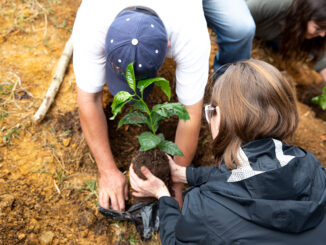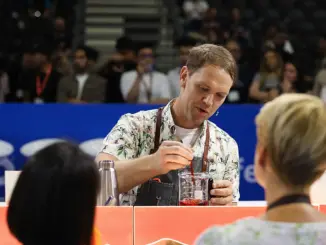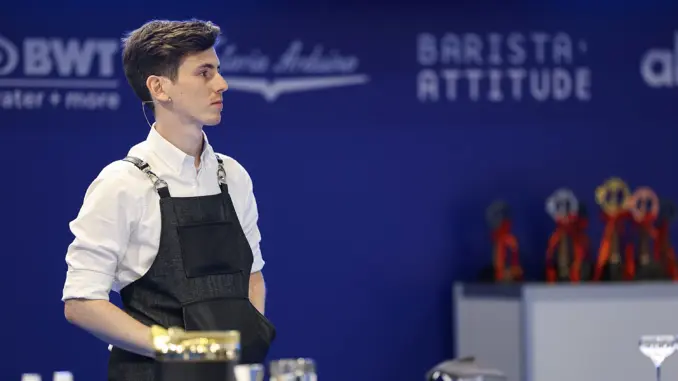
Daniele Ricci, a 25-year-old Italian barista, recently achieved second place at the World Barista Championship. We spoke with him about this experience and much more.
BY TANYA NANETTI
SENIOR ONLINE CORRESPONDENT
Photos by Federico Lucas Pezzetta
The latest edition of the World Barista Championship at the World of Coffee in Athens, Greece, was a roller coaster of emotions: Not only did it crown Boram Um as the first-ever champion from Brazil, but it also recognized Daniele Ricci with second place, the best result ever achieved by an Italian barista in the 23 editions of the World Barista Championship.
We caught up with Daniele, originally from Italy and currently working in Zurich, Switzerland, to talk about the competition, how different the specialty coffee scene is in Europe, and more.
Barista Magazine: Hello Daniele, and congratulations on your extraordinary result at the World Barista Championship. How does it feel, at just 25 years old, to be not only the second-best barista in the world, but also the Italian barista with the best result ever at a World Barista Championship?
Daniele Ricci: It’s a great feeling; it was a great honor for me to represent my country at the WBC, and being able to achieve second place made me feel proud of the team’s work. Moreover, it was really exciting when Francesco Sanapo, the only Italian finalist before this year, came to congratulate me. … I saw that he was very happy!
We would like to know more about you, starting from the beginning: What place does coffee have in your earliest memories? And what is coffee to you today?
Coffee came into my life as a “let’s try it, why not?“ when I was in high school, when I first approached the “SCA Introduction to Coffee.“ Over the years it has grown in importance and time, and today it is more than a passionate job; it is impossible for me to imagine a life without being in the coffee business.
Have you been a lover of traditional Italian coffee, or did your love of coffee start with specialty coffee?
I never consumed traditional Italian coffee because I was not used to drinking coffee before approaching specialty coffee. I may have only had a couple of coffees when my dad used to make Moka pot.
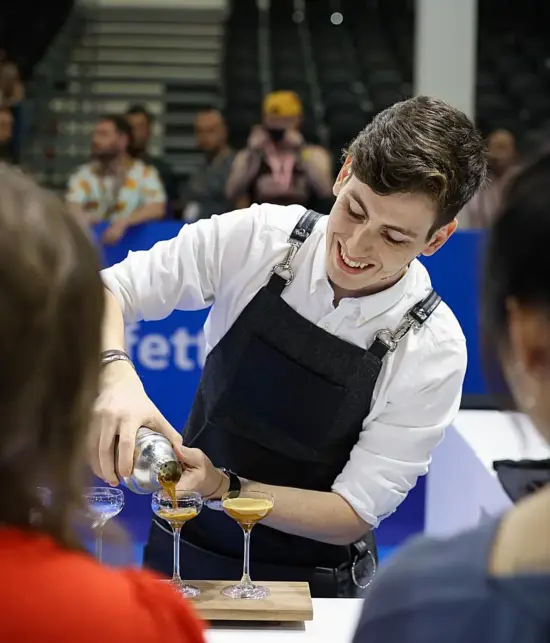
Can you briefly tell us about your career in the coffee world?
I started working as a barista in Bugan Coffee Lab, in Bergamo (Italy). There I learned a lot about coffee and they treated me like a son, which is why we are still on very good terms and why I am also part of the Bugan team. After a couple of years, I wanted to go abroad to explore the European coffee scene, so I moved to Amsterdam, where I stayed for two years, working as a barista and trainer at Bocca Coffee Roasters. At the end of 2020, I got in touch with Emi (Fukahori) and Mathieu (Theis), and I moved to Zurich, joining MAME.
So how did you end up in Zurich? And what is the experience like working alongside multiple-time coffee champions Mathieu Theis and Emi Fukahori?
I work as head barista, trainer (for customers and baristas), and quality control manager because for us, the quality of the coffee is paramount. I came here through a friend, Tom Balerin, who used to work here. It was hard to leave Amsterdam, partly because I was living with my friend Sasha Stefani (who helped me a lot at both WBCs and nationals), but I knew it was the right choice for me. Working with Emi and Mathieu is very interesting because we work together to achieve the same goals every day, which is quality and challenge through competitions.
You have worked in the specialty-coffee industry in Italy and the Netherlands, and now in Switzerland. What are the main differences and similarities between the three specialty-coffee scenes?
They are all very different, both in terms of coffee culture and habits. The biggest similarity is the amount of milk used in the Netherlands and Switzerland, compared to Italy, is crazy. On the other hand, I see much more interest in filter coffee outside of Italy, although lately our culture has been shifting from espresso only to filter. The main difference, unfortunately, is the price: Italy has to raise the price of a good cup of coffee; cheap espresso is one of the reasons why many times we don’t give enough importance and attention to its quality.
Let’s move to the recent competition, starting with the theme of your routine: how using intentional fermentation processing techniques unlocks new flavors and the full potential of coffee. What are your thoughts on fermentations? Are you still in love with fermented coffee or do you prefer more classic processing?
I think “fermented“ is an overused term in our industry when it comes to explaining different coffees to customers. Because the word “fermented“ often brings to mind alcoholic notes or cocoa flavors, very often people don’t like these types of coffees because they might be too funky for them. I really like to analyze the specific fermentation that the coffee has undergone, so I don’t discard fermented coffees by default because they have many different things to offer based on the way they have been processed, but at certain times of the day, I prefer some natural classics.
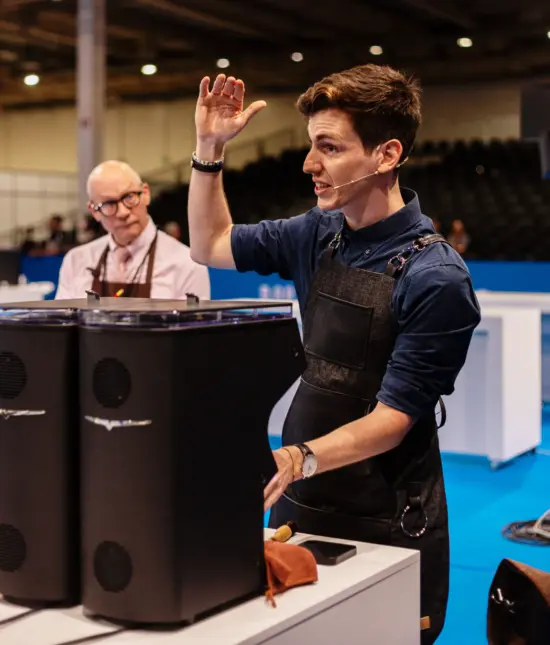
Which beans did you choose for your espresso courses? Why?
I used two varieties from the same farm, Finca Milàn, from UBA Coffee in Colombia: a Gesha and a Caturra. I blended them together in a ratio of 18g Gesha, 2g Caturra, because I needed both to build the best and most consistent espresso possible, starting with the mouthfeel, the sweet acidity, and the floral part of the Gesha. I thought of the Caturra because it added a nice sweetness and an incredible melon quality to the cup.
For the milk courses, did you use the same coffee? Why? What about the milk?
For my milk beverages, I increased the percentage of Caturra because I wanted to achieve more fruitiness in the espresso, highlighting the sweetness while still preserving the balance with Gesha. The milk was special and came from a farm in Maleo, a small town in Italy. I have been working with Simone, the farmer, for three years, and after many experiments we got the best and freshest product possible for the competition. The milk produced by his Guernsey cows is incredibly rich and sweet.
What can you tell us about the signature drink you presented at the end of the routine?
The idea behind the signature drink was to create a mocktail, and I have to say thank you to Andrea Villa, Italian 2020 Coffee in Good Spirits (CIGS) champion and seventh at the 2022 World CIGS Championship. We built this drink together, trying to find interesting new ingredients, such as saffron and Timur pepper, that would elevate the drink to the next level. It was very interesting to see how this Caturra (I used 100% of it for my signature drink) was really unlocked in this course and how all the ingredients created a whole new experience for the judges.
You ended your routine by burning coffee cards. Why?
The message I wanted to give at the end of the presentation was related to the innovation that we need to continue to embrace, to get rid of our beliefs (represented by the cards) based on traditional brewing techniques. It was a bit strong as a concept to end the presentation, but I really wanted to share it with the judges, while also giving it a magical touch and a bit of fun.
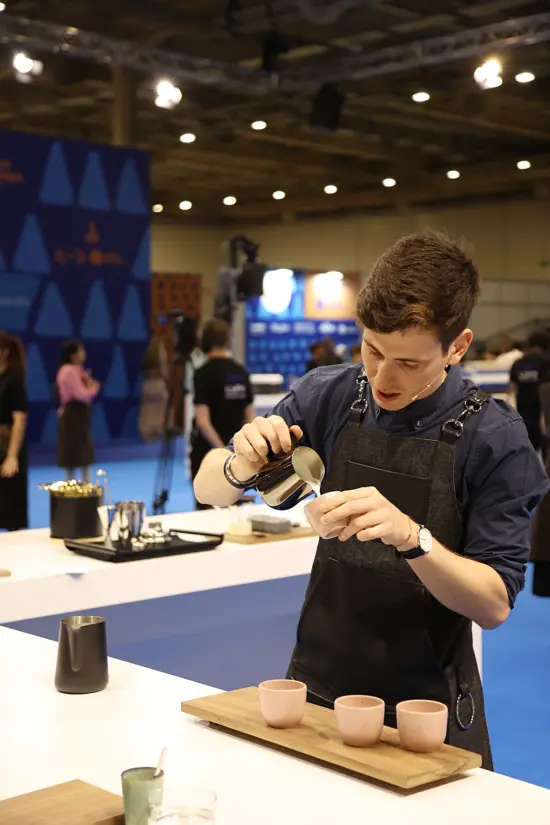
Behind an extraordinary coffee, there is always an equally extraordinary farm: Can you tell us something about Finca Milàn?
Throughout my collaboration with Finca Milàn, I worked mainly with Andrès Julio Quiceno, who is a farmer and producer there. I only met the owner Julio Madrid through video call and he was very happy that I was (using) their coffee. I worked closely with Andrès, who did such a good job with (the) lot batch that I felt very proud and honored to be able to represent his legacy on stage. And I am sure that this is just the beginning of our collaboration.
After this fantastic achievement at the World Barista Championship, what are your expectations for the future? Is there any new project or goal you would like to share with us?
I work with different companies on a number of projects, I am involved in training, research and development, and events, as well as barista and quality control. I enjoy each of these tasks, so I can’t wait to see what’s next for me! I would love to help people compete, visit more farms, build a strong network, and continue to immerse myself in innovations.
Besides being one of the best baristas in the world, who is Daniele? Hobbies, passions, everything but coffee?
I am a very friendly, quiet person and curious about many things. I love mountains, stand-up comedians, driving, and dogs. My main hobbies are sports, and I am a big fan of soccer and motors. I like to share my knowledge of coffee, wine, beers, olive oil, or food in general, always looking for similarities and differences.
Finally, a curiosity: I read in an interview that you do not like to make coffee at home for your family. Is that true? Why?
It is true, unfortunately. I would like to make coffee for them, like I do for my girlfriend, or for my friends when they are with me. I don’t make coffee for them when I’m in my hometown because they don’t appreciate specialty coffee, and we have discussed this enough, but they are happy with their choice. However, they have always followed me and actively supported me in competitions.
ABOUT THE AUTHOR
Tanya Nanetti (she/her) is a specialty-coffee barista, a traveler, and a dreamer. When she’s not behind the coffee machine (or visiting some hidden corner of the world), she’s busy writing for Coffee Insurrection, a website about specialty coffee that she’s creating along with her boyfriend.
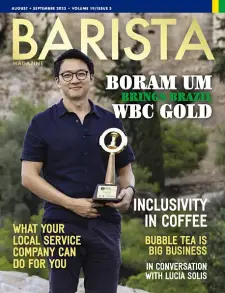
READ THE LATEST BARISTA MAGAZINE
Out now: It’s the August + September 2023 issue of Barista Magazine, featuring Boram Um of Brazil on the cover. Read it for free with our digital edition. Get your Barista Magazine delivered; start a subscription today! Visit our online store to renew your subscription or order back issues.



